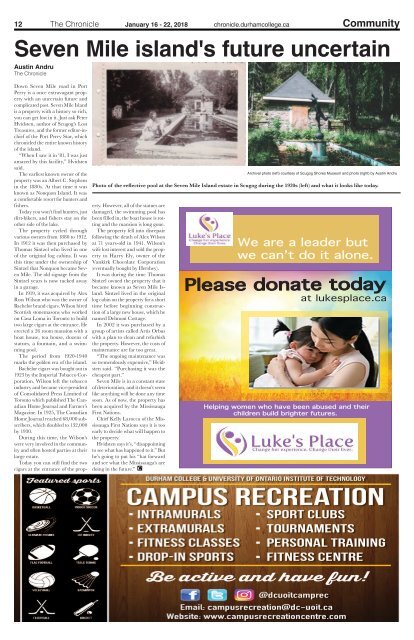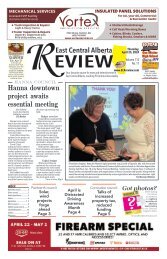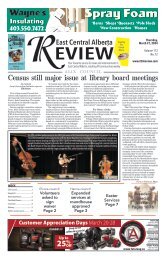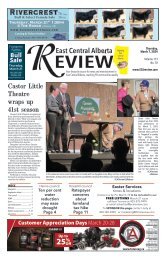You also want an ePaper? Increase the reach of your titles
YUMPU automatically turns print PDFs into web optimized ePapers that Google loves.
12 <strong>The</strong> <strong>Chronicle</strong> January 16 - 22, 20<strong>18</strong> chronicle.durhamcollege.ca Community<br />
Seven Mile island's future uncertain<br />
Austin Andru<br />
<strong>The</strong> <strong>Chronicle</strong><br />
Down Seven Mile road in Port<br />
Perry is a once extravagant property<br />
with an uncertain future and<br />
complicated past. Seven Mile Island<br />
is a property with a history so rich,<br />
you can get lost in it. Just ask Peter<br />
Hvidsten, author of Scugog’s Lost<br />
Treasures, and the former editor-inchief<br />
of the Port Perry Star, which<br />
chronicled the entire known history<br />
of the island.<br />
“When I saw it in '81, I was just<br />
amazed by this facility,” Hvidsten<br />
said.<br />
<strong>The</strong> earliest known owner of the<br />
property was an Albert C. Stephens<br />
in the <strong>18</strong>80s. At that time it was<br />
known as Nonquon Island. It was<br />
a comfortable resort for hunters and<br />
fishers.<br />
Today you won’t find hunters, just<br />
dirt-bikers, and fishers stay on the<br />
other side of the lake.<br />
<strong>The</strong> property cycled through<br />
various owners from <strong>18</strong>80 to 1912.<br />
In 1912 it was then purchased by<br />
Thomas Sintzel who lived in one<br />
of the original log cabins. It was<br />
this time under the ownership of<br />
Sintzel that Nonquon became Seven<br />
Mile. <strong>The</strong> old signage from the<br />
Sintzel years is now tucked away<br />
in a garage.<br />
In 1919, it was acquired by Alex<br />
Ross Wilson who was the owner of<br />
Bachelor brand cigars. Wilson hired<br />
Scottish stonemasons who worked<br />
on Casa Loma in Toronto to build<br />
two large cigars at the entrance. He<br />
erected a 26 room mansion with a<br />
boat house, tea house, dozens of<br />
statues, a fountain, and a swimming<br />
pool.<br />
<strong>The</strong> period from 1920-1940<br />
marks the golden era of the island.<br />
Bachelor cigars was bought out in<br />
1923 by the Imperial Tobacco Corporation.<br />
Wilson left the tobacco<br />
industry and became vice-president<br />
of Consolidated Press Limited of<br />
Toronto which published <strong>The</strong> Canadian<br />
Home Journal and Farmer’s<br />
Magazine. In 1925, <strong>The</strong> Canadian<br />
Home Journal reached 68,000 subscribers,<br />
which doubled to 132,000<br />
by 1930.<br />
During this time, the Wilson’s<br />
were very involved in the community<br />
and often hosted parties at their<br />
large estate.<br />
Today you can still find the two<br />
cigars at the entrance of the property.<br />
However, all of the statues are<br />
damaged, the swimming pool has<br />
been filled in, the boat house is rotting<br />
and the mansion is long gone.<br />
<strong>The</strong> property fell into disrepair<br />
following the death of Alex Wilson<br />
at 71 years-old in 1941. Wilson’s<br />
wife lost interest and sold the property<br />
to Harry Ely, owner of the<br />
Vankirk Chocolate Corporation<br />
(eventually bought by Hershey).<br />
It was during the time Thomas<br />
Sintzel owned the property that it<br />
became known as Seven Mile Island.<br />
Sintzel lived in the original<br />
log cabin on the property for a short<br />
time before beginning construction<br />
of a large new house, which he<br />
named Delmont Cottage.<br />
In 2002 it was purchased by a<br />
group of artists called Artis Orbus<br />
with a plan to clean and refurbish<br />
the property. However, the costs of<br />
maintenance are far too great.<br />
“<strong>The</strong> ongoing maintenance was<br />
so tremendously expensive,” Hvidsten<br />
said. “Purchasing it was the<br />
cheapest part.”<br />
Seven Mile is in a constant state<br />
of deterioration, and it doesn’t seem<br />
like anything will be done any time<br />
soon. As of now, the property has<br />
been acquired by the Mississauga<br />
First Nations.<br />
Chief Kelly Larocca of the Mississauga<br />
First Nations says it is too<br />
early to decide what will happen to<br />
the property.<br />
Hvidsten says it’s, “disappointing<br />
to see what has happened to it.” But<br />
he’s going to put his “hat forward<br />
and see what the Mississauga’s are<br />
doing in the future.”<br />
Archival photo (left) courtesy of Scugog Shores Museum and photo (right) by Austin Andru<br />
Photo of the reflective pool at the Seven Mile Island estate in Scugog during the 1920s (left) and what it looks like today.


















